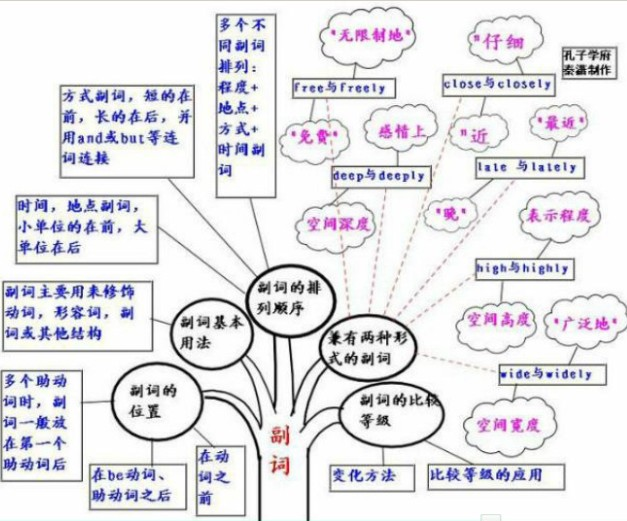本试题 “______ has ridden on a railway train knows how _______ another train flashes by when it is traveling inthe opposite direction.[ ]A. Who; rapidlyB....” 主要考查您对副词
主语从句
等考点的理解。关于这些考点您可以点击下面的选项卡查看详细档案。
- 副词
- 主语从句
副词的概念:
副词是指在句子中表示行为或状态特征的词,用来修饰动词、形容词、其他副词、介词短语、非谓语动词乃至整个句子,表示时间、地点、程度、方式等概念。
副词的位置:
1)在动词之前。
2)在be动词、助动词之后。
3)多个助动词时,副词一般放在第一个助动词后。
注意:
a. 大多数方式副词位于句尾,但宾语过长,副词可以提前,以使句子平衡。
如:We could see very clearly a strange light ahead of us.
b. 方式副词well,badly糟、坏,hard等只放在句尾。
如:He speaks English well.
副词的排列顺序:
1)时间,地点副词,小单位的在前,大单位在后。
2)方式副词,短的在前,长的在后,并用and或but等连词连接。
如:Please write slowly and carefully.
3)多个不同副词排列:程度+地点+方式+时间副词。
注意:副词very可以修饰形容词,但不能修饰动词。
改错:(错)I very like English.
(对)I like English very much.
注意:副词enough要放在形容词的后面,形容词enough放在名词前后都可。
如:I don't know him well enough.
There is enough food for everyone to eat.
There is food enough for everyone to eat.
兼有两种形式的副词:
1)close与closely:
close意思是“近”;closely意思是“仔细地”。
如: He is sitting close to me.
Watch him closely.
2)late与lately:
late意思是"晚";lately意思是“最近” 。
如:You have come too late.
What have you been doing lately?
3)deep与deeply:
deep意思是“深”,表示空间深度;deeply时常表示感情上的深度,“深深地” 。
如:He pushed the stick deep into the mud.
Even father was deeply moved by the film.
4)high与highly:
high表示空间高度;highly表示程度,相当于much。
如:The plane was flying high.
I think highly of your opinion.
5)wide与widely:
wide表示空间宽度;widely意思是“广泛地”,“在许多地方”。
如:He opened the door wide.
English is widely used in the world.
6)free与freely:
free的意思是“免费”;freely的意思是“无限制地”。
如:You can eat free in my restaurant whenever you like.
You may speak freely, say what you like.
副词知识体系:

主语从句的概念:
如果一个句子在复合句中充当一个主语,那么这个句子就是主语从句。主语从句通常由从属连词that,whether,if和连接代词what,who,whichwhatever,whoever以及连接副词how,when,where,why等词引导。that在句中无词义,只起连接作用。
主语从句用法:
1、主语从句的引导词:
主语从句通常由连词that和whether、连接代词或连接副词以及关系代词型what引导:
如:That he is still alive is a wonder. 他还活着,真是奇迹。
When we arrive doesn't matter. 什么时候到没有关系。
What we need is money. 我们需要的是钱。
What I want to know is this. 我想知道的就是这一点。
Whether they would support us was a problem. 他们是否会支持我们还是一个问题。
2、主语从句与形式主语it:
有时为了考虑句子平衡,通常在主语从句处使用形式主语it,而将真正的主语从句移至句末。这分三种情况:
(1)对于以连词that引导的主语从句,通常用形式主语代主语从句:
如:It's a pity that he didn't come. 很遗憾他没来。
(2)对于以连接代词(副词)引导的主语从句,可以使用形式主语代主语从句,也可直接在句首使用主语从句:
如:Whether they would support us was a problem. 他们是否会支持我们还是一个问题。
It was a problem whether they would support us. 他们是否会支持我们还是一个问题。
(3)对关系代词型what引导的主语从句,通常不用形式主语,总是主语从句放在句首:
如:What we need is money. 我们需要的是钱。
What I want to know is this. 我想知道的就是这一点。
(4)如果句子是疑问句,则必须用带形式主语it的结构:
如:Is it true that he is the girl's father? 他是那女孩的父亲,是真的吗?
How is it that you are late again? 你怎么又迟到了?
3、连词that的省略问题:
引导主语从句的连词that有时可省,有时不能省,其原则是:
若that引导的主语从句直接位于句首,则that不能省略;
若that引导的主语从句位于句末,而在句首使用了形式主语it,则that则可以省略:
如:That you didn't go to the talk was a pity. 很遗憾你没去听报告。(that不可省)
It was a pity(that) you didn't go to the talk. 很遗憾你没去听报告。(that可省)
主语从句应注意的几个问题:
1、that引导的主语从句既可放在句首,也可放在句尾,但在下列情况下that从句不可提前。
(1)在It is said/reported...that结构中:
如:It is reported that a bank was robbed yesterday.
(2)在Ithappened/occurred...结构中:
Ithappenedthattheteacherwasnotintheofficethatday.
(3)含主语从句的复合句是疑问句时:
如:Is it ture that you will give up the job?
2、下面这种情况常用it作形式主语。在It doesn't matter+what/whatever…结构中。
如:It doesn't matter what you say.
3、由what引导的主语从句谓语动词单复数问题 what引导的主语从句一般按单数对待,但是,在实际使用中究竟按单数还是按复数对取决于其成分的含义。
如:What we need is more time.
What were left behind were five empty bottles.
与“______ has ridden on a railway train knows how _______ an...”考查相似的试题有:
- The plane will be landing in ____ 20 minutes.[ ]A. equallyB. approximatelyC. regularlyD. commonly
- There are forty five students in our class, and they are _____ interested in football.A.mostB.almostC.nearlyD.mo...
- 短文改错。The student loan program has give financial aid to over four million of students over the last 10 years.Ban...
- We all do more speaking _______,even when we have a break after class.A.now and thenB.by and byC.step by stepD...
- Nobody knew that the reason______ he was often blamed. Perhaps that was______ he made the same mistakes told several ...
- All the neighbors admire this family ______ the parents are treating their child like a friend.A.whyB.whereC.which...
- I’m not sure whether this is the book ______ my brother read the year before last.A.whoseB.asC.whatD.which
- It was __________she was injured in the accident _______ she didn’t come to the party yesterday.A.as; which B. becaus...
- The shopkeeper did not want to sell for ________ he thought was not enough.A.whereB.howC.whatD.Which
- While paying for the gas,Mary’s mother told the seller about the nice night she had spent at the Welcome Inn.A.in wh...